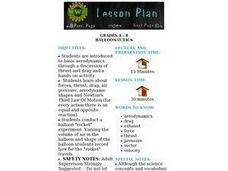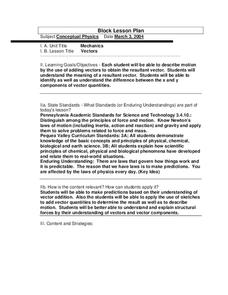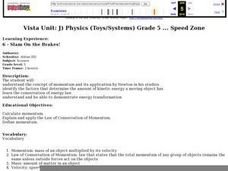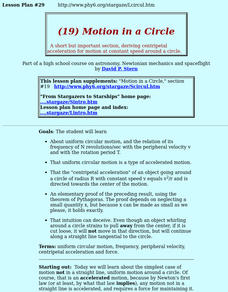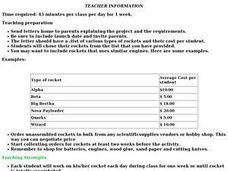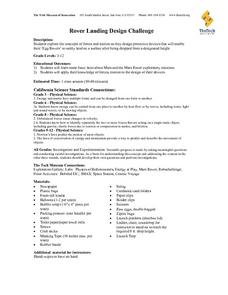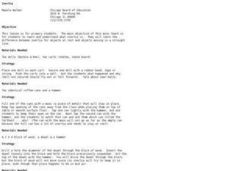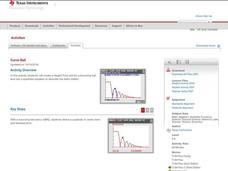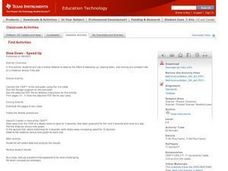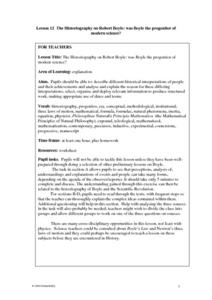Curated OER
Balloonautics
Young scholars are introduced to basic aerodynamics through a discussion of thrust and drag and a hands-on activity. They examine the forces of thrust, drag, air pressure, aerodynamic shapes and Newton's Third Law Of Motion.
Curated OER
Inertia
Students conduct an experiment to apply Newton's first law of motion. They observe the inertia of an object in regard to its mass. The students record and graph the outcomes of their investigation and present the relationship between...
Curated OER
F = Ma, Inertia, And Action-reaction
Fourth graders investigate Newton's Second and Third Laws of Motion. They determine what makes objects harder or easier to push. While investigating they determine how applying force in order balance out gravity allows things to stay...
Curated OER
Electricity and Magnets
For this physics review worksheet, students compare average and instantaneous speed, review Newton's laws, electricity, and magnets. This worksheet has 12 fill in the blank, 8 short answer questions, and 6 problems to solve.
Curated OER
Vectors
Learners describe motion by the use of adding vectors. They identify the difference between the x and y components of vector quantities. Students are given the Paper Bridge Building handout and the instructions as to where to perform...
Curated OER
Bobsled Challange
Students investigate the effects of materials on the friction between a "bobsled" and the track. They explore the effects of weight on the motion of the bobsled. Students design a bobsled for either fast or slow movement. They discuss...
LABScI
Projectiles: Target Practice
Angry Birds prepared them, but now pupils must prove their skills with projectiles! Scholars test different variables to determine which ones impact the distance the projectile flies. The experiment provides connections to kinetic and...
Curated OER
Slam On the Brakes!
Fifth graders study the concept of momentum and its application by Newton in his studies. They view a demonstration and complete an experiment with toy cars on a racetrack that shows them the properties of momentum and how velocity and...
Curated OER
Merging Art and Science?
Students approach science through artwork. In this art and science instructional activity students work together to develop theories and gather data.
Curated OER
Motion in a Circle
Students explore uniform circular motion, and the relation of its frequency of N revolutions/sec with the peripheral velocity v and with the rotation period T. They examine how uniform circular motion is a type of accelerated motion.
Curated OER
Motion in a Circle
Students study about deriving centripetal acceleration for motion at constant speed around a circle.
Curated OER
Building and Launching Rocket Kits
Students, in groups, build and decorate rocket kits and then launch them.
Curated OER
Rover Landing Design Challenge
Learners examine the concepts of forces and motion. They work together to design protective devices for their egg rovers as they are dropped from a specific height. They record their observations and discuss.
Curated OER
The Law of Inertia
Students practice the 4 question strategy to form more questions and develop further experiments. The four questions are engage, explore, explain, and elaborate. They use the 4 question strategy on an investigation involving the mass...
Curated OER
How Can We See Inertia?
Students conduct 8 experiments to gain an understanding of inertia. Students use a variety of materials to conduct these experiments. Students learn the difference between objects at rest and objects moving in a straight line.
Curated OER
Skateboard Science
Young scholars investigate how skaters can turn in midair. In this physics lesson, students relate Newton's Laws to skateboarding. They carry out the maneuver with the help of their classmate.
Curated OER
Pop Rockets
Pupils study Newton's Third Law of Motion which involves action and reaction. They discover what makes a rocket go and then design and construct a rocket that will launch the furthest using the pressure created by an antacid tablet...
Curated OER
Rocket Pinwheel
Students observe a balloon-powered pinwheel to study the principles of rocketry. They study Newton's Third Law of Motion.
Curated OER
Curve Ball
Learners explore the concept of parabolas by collecting quadratic data on a bouncing ball as it is falling using a motion detector. They plot the data and determine the equation of the quadratic in vertex form, then determine the values...
Curated OER
Slow Down - Speed Up
Pupils explore the concept of distance and time as they use a CBR to mimic distance v. time graphs. Learners walk towards and away from the monitor to create various distance v. time graphs, then discuss what motion creates certain graphs.
Curated OER
Falling Objects
High schoolers examine the velocities of two different falling objects. They produce distance vs. time and velocity vs. time graphs using a Motion Detector and a CBL 2 to collect experimental data. Learners analyze and interpret the...
Curated OER
Scientist/ Webelos Activity Book
In this physical science worksheet, students write short responses for each scientific law in 14 different questions to obtain a merit badge.
Curated OER
Vectors
Students describe motion by the use of adding vectors to obtain the resultant vector. They comprehend the meaning of a resultant vector. Students identify the difference between the x and y components of vector quantities. Students...
Curated OER
The Historiography on Robert Boyle: Was Boyle the Progenitor of Modern Science?
High schoolers participate in a warm-up activity by attending a football match writing an account of who won the game. They discuss how their account could differ from someone else's account of the game. They discuss how different...


